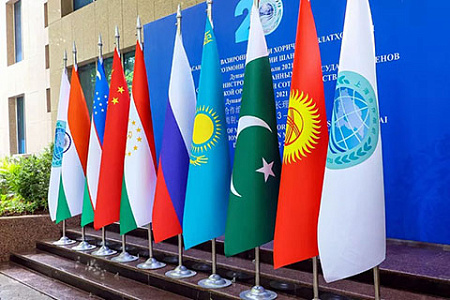
As foreign ministers of the Shanghai Cooperation Organisation (SCO) prepare to meet in Tianjin, China, on July 15, the bloc faces a profound crisis of identity and effectiveness. Founded in 2001 by China, Russia, and Central Asian states to foster stability, the SCO’s expansion has paradoxically introduced deep-seated rivalries that threaten to paralyze it. The organization is now grappling with the fallout from a recent armed conflict between two of its members, India and Pakistan, and the intense international pressure on another, Iran, following military strikes by Israel and the United States.
In a flurry of pre-summit diplomacy, Indian External Affairs Minister Subrahmanyam Jaishankar met with top Chinese officials, including Vice President Han Zheng and Foreign Minister Wang Yi. The talks aimed to build on a recent thaw in relations, which had deteriorated sharply after a deadly border clash in the Himalayas in June 2020. A positive turn began after a meeting between Indian Prime Minister Narendra Modi and Chinese President Xi Jinping at the BRICS summit in Kazan in October 2024. Jaishankar highlighted the 75th anniversary of diplomatic ties as a milestone, signaling a mutual desire to normalize relations.
However, this bilateral progress is overshadowed by the volatile conflict between India and Pakistan, both of whom joined the SCO in 2017. The two nuclear-armed neighbors recently engaged in military exchanges involving missiles, drones, and aircraft, and the current ceasefire remains fragile. While New Delhi insists the truce was negotiated directly between military commanders, the situation in the disputed region of Kashmir remains explosive, posing a direct challenge to the SCO’s core mandate of regional security and conflict prevention.
Adding to the instability is the precarious position of Iran, which became a full member two years ago. Tehran is reeling from attacks by Israel and the U.S. aimed at curbing its nuclear ambitions and is reportedly disillusioned by the lack of tangible support from its strategic partners, Russia and China. Moscow has publicly stated that its bilateral agreements with Iran do not include mutual military defense obligations, leaving Tehran diplomatically exposed. As a result, the Tianjin meeting becomes a critical test for Beijing’s leadership, which must now navigate these dangerous internal fractures to salvage the SCO’s credibility and project an image of unity amid escalating tensions in both South Asia and the Middle East.
